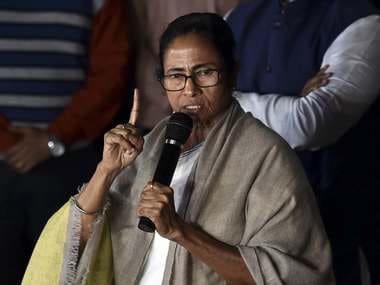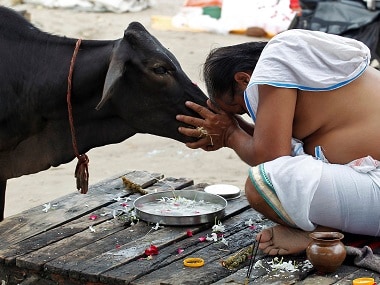In the age of post-truth politics where narratives are shaped by bias rather than an objective analysis of facts, it is hardly surprising to note that West Bengal chief minister Mamata Banerjee has fashioned herself as a “liberal” politician who is out to save India’s democracy, public institutions and the Constitutions ostensibly from the Narendra Modi government, which, according to her, is trying to spread anarchy, hatred and terror.
There are many reasons why she indulged in the theatrics of a ‘dharna’ to block the CBI from questioning Kolkata police commissioner Rajeev Kumar. Notably, the Supreme Court has directed Kumar to appear before the CBI and “fully cooperate” with the investigation into the multi-crore chit fund scams.
While court proceedings will carry on at their own pace, it is important to challenge the subversion of political discourse and democratic norms that has become the hallmark of Mamata’s words and deeds. By and large, the Bengal chief minister has been spared scrutiny because local media is too frightened to raise its voice against her, and mavens of national media are too busy focusing on Delhi as the microcosm of India to notice what’s happening elsewhere. Then there is the liberal blind spot that sees no wrong in any other political leader in India except Prime Minister Narendra Modi, who is apparently the epitome of all evil.
Since Mamata is keen on much bigger things instead of remaining tied to the boundaries of her state and hopes to emerge as the leader of an anti-BJP coalition, one hopes there will be a larger discussion on her style of functioning. Hopefully, questions that should have been asked of her long ago will be asked now.
The West Bengal chief minister has scant respect for democracy, constitutional rights of individuals, public institutions and even the judiciary. She enjoys a cult status in the state, but that status is more to do with her dictatorial strain of functioning than public affection. It is a status borne out of fear — barring the faithful and opportunist — reinforced through her heavy-handed and oppressive ways. There is a culture of fear and intimidation in Bengal, but no one is allowed to talk about it.

One university student did, back in 2012. During an interactive TV show, she had dared to ask Mamata a question when the Trinamool Congress (TMC) supremo was a freshly minted chief minister. A furious Mamata had yanked the microphone off of her and stormed out of the podium, dubbing the hapless student a “Maoist” and the audience of mostly young university students a congregation of “Maoists, SFI and CPM cadres”. Her paranoia and habit of tilting at the windmills were evident, but somehow, she escaped the tag of “intolerant”, and continues to do so.
Perhaps emboldened by the thought that her excesses will always receive the benefit of doubt, or little more than a gentle condemnation that seeks to hide more than it reveals, over the years, the Bengal chief minister has subverted norms, rights and practices with a brazenness that may startle even tinpot dictators. Therefore, for Mamata to claim that she is “saving democracy, saving the Constitution, the federal structure and India’s institutions” is a position pregnant with bitter irony.
And the irony was evident even as the drama played on at Kolkata’s Metro Channel, the location of Mamata’s so-called ‘Satyagraha’. Using Mahatma Gandhi’s political terminology doesn’t guarantee an automatic sanctification of her ’cause’, which was little more than an audacious attempt at creating a constitutional crisis to meet her larger political objectives and obfuscating the fact that the state police was impeding the CBI from doing its work.
But even as this drama was on, the state administration twice denied Uttar Pradesh chief minister Yogi Adityanath permission to land his helicopter within the precincts of the state, forcing him to land in neighbouring Jharkhand and proceed to his rally in Purulia by road.
Once inside the boundaries of Bengal, “not a single West Bengal Police vehicle or personnel from the state police was deployed to provide security cover to the Uttar Pradesh chief minister. There were no state policemen along the route the convoy took along the same national highway, NH-60A”, The Times of India reported. The report also quoted Mamata as saying: “When I visited Maharashtra and Bihar, I was not allowed to stay at any government guest house. I have not forgotten this.” This was on the BJP’s allegation that the Bengal government had denied party leaders guest house facilities in the state.
Could the chief minister of Bengal, who was on ‘dharna’ to “save democracy”, explain whether this act of pettiness was an example of “saving democracy” or undermining it?
Lest it appears that sweeping judgements are being made from a stray incident, it is worth pointing out that the Mamata Banerjee administration has also denied permission to BJP leader Syed Shahnawaz Hussain and former Madhya Pradesh chief minister Shivraj Singh Chouhan from holding rallies in the state.
The state administration’s reported actions contravene the Supreme Court order that directed the BJP to not hold a rath yatra in Bengal but allowed the party to hold rallies and public meetings in the state ahead of the Lok Sabha elections. Incidentally, among other claims, Mamata had announced from the ‘dharna’ podium that she “respects the judiciary”.
The TMC government’s paranoia over the BJP holding rallies and public meetings in the state is inexplicable. Earlier, BJP president Amit Shah’s chopper was blocked from landing in Malda, with the district administration claiming that the “airport is not ready due to ongoing construction work”. A TV channel visited the spot and found “that the helipad area was totally clean“.
Shah eventually landed in Bengal, but not before Mamata had claimed that her allowing the BJP president to hold a rally in the state is proof that she respects democracy. Considering the circumstances, which included repeated instances of vandalism of BJP posters, campaign material and structures, one has to say that Mamata was indeed “generous“.
Denying a rival party space to hold rallies and meetings — a legitimate act in democracy — should have stripped Mamata of the moral right to wax eloquent on “saving democratic norms”, but in the weird world of media narratives, that could be cubbyholed within the “quirks” of a leader than symptomatic of her autocratic behavior.
Lest we forget, this is the same chief minister whose administration slapped serious charges on a Jadavpur University professor and arrested him for forwarding a cartoon that was, by all accounts, mildly critical of the chief minister. The Calcutta High Court later ordered the state government to compensate the professor.
Maybe this should not be surprising from a chief minister who had once dismissed a rape case as “shajano golpo” (a fabricated story) while her party colleague and minister Madan Mitra had remarked on a TV channel: “Why did a woman with children at home, who is separated from her husband, go to a nightclub?”
The chief minister had exclaimed from the site of her protest that she respects all forms of freedom. The assembled media could have reminded her that in 2017, it was her administration that had arrested two individuals over a Facebook post criticising traffic restrictions during Durga Puja.
Mamata made a big deal of respecting institutions and accused the Modi government of undermining them. Perhaps she has forgotten that she leveled “military coup” charges against the Indian Army for ostensibly being deployed “in the state without the permission of the state government”. Her claims later flew in the face of evidence, and her paranoia resurfaced again. The then defence minister, Manohar Parrikar, had told the Lok Sabha that the army’s deployment in West Bengal and the North East was a “routine exercise”.
Army's letters (written earlier) in connection with the force deployment in West Bengal. pic.twitter.com/YUm4BiOI5k
— ANI (@ANI) December 2, 2016
Furthermore, Mamata has also issued protestations against the Modi government for not extending courtesies that are natural in a democracy. It isn’t clear which definition of “courtesy” would describe the chief minister’s acts of blocking the prime minister’s speeches from being telecast in Bengal’s schools and colleges several times in 2017.
Explaining why the administration had ignored a directive by the University Grants Commission to organise a live telecast of Modi’s speech on 11 September, the 125th anniversary of Swami Vivekananda’s address at the World Parliament of Religions in Chicago, state Education Minister Partha Chatterjee said, “It is not acceptable to us as we feel it is a clear attempt at saffronisation of education.”
If Modi’s speech was an attempt to “saffronise education”, how can we define Bengal’s attempts at replacing commonly-used Bengali terms such as “ramdhonu” (rainbow) into “rongdhonu”, or “akashi” (sky blue) with “asmani” in school textbooks?
The point of these examples is to show that Mamata’s protestations in favour of “democracy, Constitution or public institutions” are not only hollow and hypocritical, but they indicate that she poses a unique danger to polity.
source: Firstpost.com







































